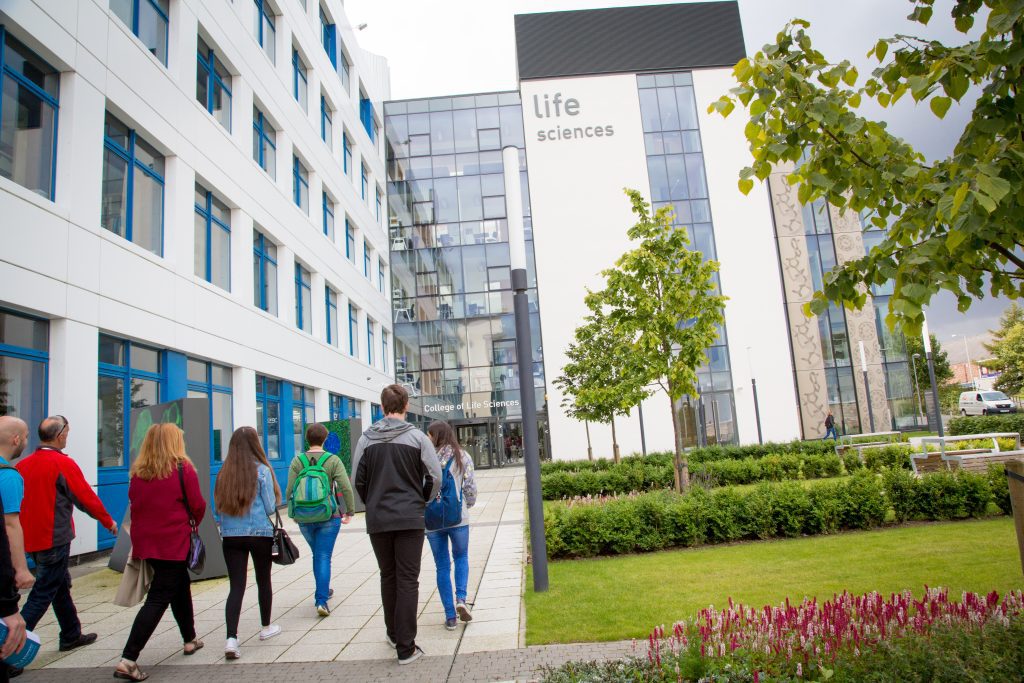HID® Mobile Access® Offers Students and Staff the Ability to Use Their Smartphones to Gain Touchless Entry Into Buildings
HID, the worldwide leader in trusted identity solutions, announces today that the University of Dundee is updating its city campus estate implementing HID® Mobile Access® and signature HID Signo™ readers throughout its buildings to guarantee it has a modern, secure and reliable access control system to allow staff and students to enter using both RFID cards and smartphones.
The project will involve buying and installing new mobile-ready HID Signo readers at around 40 buildings – a staged rollout being completed over a two-year period by specialist security installer, Scottish Communications Group. In addition, the University has purchased 10,000 HID Mobile Access licenses to offer its academic community the option to use their Apple and Android smart phones for touchless entry into its facilities.
“We wanted a modern system which is safe, secure and easy for everyone to use,” says Colin Stebbing, the University’s Head of Precinct Services. “Complying with forthcoming legislation was also another important project requirement. With bills like Martyn’s Law soon to be enacted, ensuring the University is ready for this was important given that we have a duty to protect to ensure everyone is safe. The HID solution enables us to not only lock down buildings immediately, but it has built-in functionality which we can leverage over time, meaning we’ve invested in ‘future proof’ equipment which will last us long term.”
The University of Dundee is a public research university in Scotland renowned for its academic excellence in dentistry, medicine, science and engineering and life sciences. Based in the heart of the city, it is home to over 16,000 students, 3,300 staff and is ranked 33rd in the Sunday Times Good University Guide 2024. A thriving institution with ambitious development plans, it is currently building a new £40 million facility called the Innovation Hub. This will offer commercial organizations flexible laboratory, meeting and office space and, over the next 10 years, it is anticipated the Hub will help create up to 280 new high-quality jobs.
The new HID Signo readers integrate with the University’s existing AEOS access control software from Nedap. Supporting both native Bluetooth® and Near Field Communication (NFC) connectivity, they allow touchless smartphone entry and are fast to install as the wiring uses common protocols like OSDP [Open Supervised Device Protocol] and Wiegand. Furthermore, existing access cards already in circulation can be used with the new HID Signo readers thereby speeding up the rollout.
Historically, the University used to print and issue plastic RFID cards so staff and students could access buildings. This process was laborious and time-consuming, especially during peak times like Freshers Week, when some 2,500 – 3,000 undergraduate and postgraduate students enroll. Issuing cards was logistically complex due to the high demand and the need for thorough identity checks, which could take up to 10 minutes per card.
Shifting to HID Mobile Access – which utilizes cloud-based HID Origo management software integrating with the AEOS system – completely changes this and delivers wireless credentialling. This significantly simplifies all the licensing, allocation of credentials, setting of building access rights, validating or revoking of IDs – all of which is now done virtually and remotely.
“Once registered by Student Services in AEOS, a student simply gets an email to their phone, they tap on a link, the app automatically uploads and a mobile credential is granted,” says Paul Brady, HID’s End User Business Manager for Physical Access Control Solutions. “Not only does this improve the overall student experience because it’s substantially quicker and more efficient, but it’s far more sustainable as you’re not issuing PVC cards anymore.”
While the strategy and aspiration are for the university population to shift wholesale to mobile access, its approach today is to operate a dual system. “We recognize that some visitors and staff still want to use a physical pass and not all employees have a university issued mobile credential,” explains Stebbing. “HID Signo readers allow us to run both credential types in tandem, with HID Mobile Access giving us the option to scale up to include digital wallets from Apple and Google, as well as integrate with digital campus cards should we decide to go down this route in the future.”
Given RFID cards are still required today, the University of Dundee utilizes its reliable FARGO DTC4500e printers to back up this transition to digital transformation. The FARGO range of ID card printers integrate easily with the AEOS software so that Student Services staff can easily issue physical IDs themselves.
“HID Signo readers are going in now across the main buildings including the new Innovation Hub site,” says Stuart Leslie, Scottish Communications Group’s director. “HID’s reputation is built on reliability and security with its solutionssupporting the latest encryption, communications and authentication standards. Their devices have an open architecture so they’re easy to install and integrate which reduces the cost for the university and makes time to value that much quicker.”
In addition, Scottish Communication Group is supplying Motorola MOTORTRBO Ion smart radios to the University’s security staff. The radios will be configured to run HID Mobile Access so they can open doors fitted with the new HID Signo readers. Because these smart radios also link to the University’s CCTV, alarm systems and CriticalArc Safezone® App, security staff need carry only a single device to fulfill their duties.

Building, Design & Construction Magazine | The Choice of Industry Professionals





